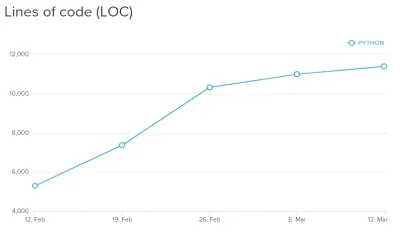beem is a python library for steem. It supports HTTP and Websocket connections and is ready to use with AppBase-API calls. The current version of beem is 0.19.16. beem has 287 unit tests with a coverage of 67% - 76% (depends on how it is calculated). beem can be installed by:
pip install beem
or
conda install beem
and updated by
pip install -U beem
or
conda update beem
Statistics
conda-forge download statistic:

Visitors per day on github (blue line are unique visitors):


Use the testnet-server to test broadcast commands
beem can now be used to broadcast comands with the testnet-server wss://testnet.steem.vc.
At first, a new user has to be created by:
curl --data "username=foo&password=barman" https://testnet.steem.vc/create
You can use this password, to create the different keys by (username and password are from the curl command):
from beemgraphenebase.account import PasswordKey, PrivateKey, PublicKey
from beem.steem import Steem
from beem.account import Account
username = "" # enter username
password = "" # enter password
stm = Steem(node=["wss://testnet.steem.vc"])
prefix = stm.prefix # Should be STX
active_key = PasswordKey(username, password, role="active", prefix=prefix)
owner_key = PasswordKey(username, password, role="owner", prefix=prefix)
posting_key = PasswordKey(username, password, role="posting", prefix=prefix)
memo_key = PasswordKey(username, password, role="memo", prefix=prefix)
active_privkey = active_key.get_private_key()
posting_privkey = posting_key.get_private_key()
owner_privkey = owner_key.get_private_key()
memo_privkey = memo_key.get_private_key()
You can then add these keys to the wallet (Replace 123 with a secret passphrase):
stm.wallet.wipe(True)
stm.wallet.create("123")
stm.wallet.unlock("123")
stm.wallet.addPrivateKey(active_privkey)
stm.wallet.addPrivateKey(owner_privkey)
stm.wallet.addPrivateKey(posting_privkey)
stm.wallet.addPrivateKey(memo_privkey)
or by entering the Keys directly:
stm = Steem(node=["wss://testnet.steem.vc"], wif={'active': str(active_privkey), 'posting': str(posting_privkey), 'memo': str(memo_privkey)})
You are now ready to test beem:
account = Account(username, steem_instance=stm)
account.transfer("test1", 1, "STEEM", "test")
You can also build the broadcast call by hand:
from beem.transactionbuilder import TransactionBuilder
from beembase.operations import Transfer
tx = TransactionBuilder(steem_instance=stm)
tx.appendOps(Transfer(**{
"from": account["name"],
"to": "test1",
"amount": "1 STEEM",
"memo": "test"}))
tx.appendSigner(account, "active")
tx.sign()
tx.broadcast()
Account history
The account history commands were completely rewritten.
There are three commands now as in python-steem:
- get_account_history, history, history_reverse
get_account_history
get_account_history(self, index, limit, start=None, stop=None, order=-1, only_ops=[], exclude_ops=[], raw_output=False)
index and limit are related to virtual_op_count. All account related transaction are yielded starting from index >= limit and stop at index-limit. If order is 1, the oldest entry is the first output, otherwise for order=-1 the newest entry is given out first. The output is stopped when limit entry are submitted. Addionally, start and stop can be set to a certain date and entry before start and after stop are skipped.
only_ops can be used to limit the op, e.g. only_ops=["transfer]. exclude_ops works the same way, but listed operation are excluded.
If raw_output is False, the output is identical to python-steem, when using raw_output=False.
history and history_reverse
def history_reverse / history
(
self, start=None, stop=None,
only_ops=[], exclude_ops=[], batch_size=1000, raw_output=False
)
Both function are similar to get_account_history, but can be used to get all entries. When an account has 5000 ops, and batch_size is 1000, get_account_historyis called internally five times.
start and stop can be int numbers or datetime dates.
Lets calculate the curation reward from the last 7 days:
from datetime import datetime, timedelta
from beem.account import Account
from beem.amount import Amount
acc = Account("holger80")
stop =datetime.utcnow() - timedelta(days=7)
reward_vests = Amount("0 VESTS")
for reward in acc.history_reverse(stop=stop, only_ops=["curation_reward"]):
reward_vests += Amount(reward['reward'])
reward = acc.steem.vests_to_sp(reward_vests.amount)
The result is slightly different from curation_stats() from python-steem, but I'm convinced that only the output of beem is correct.
Changes
Parallel processing improved
Refactoring and Handling of other prefix (e.g. testnet) improved
Transactionbuild
- Automatic Signing with owner key removed
Beembase
- Beembase/account and beembase/bip38 removed as they are using beemgraphenebase/bip38 and beemgraphenebase/account
Examples
- benchmark_nodes.py and op_on_testnet.py added
test_testnet.py improved
Prepare next release
Add new example waitForRecharge.py
Next release 0.19.16
Account
- get_withdraw_routes added
- get_account_votes fixed for appbase
- get_vote, has_voted added
- virtual_op_count, get_curation_reward curation_stats added
- get_account_history and history_reverse added
- history improved
Blockchain
- hash_op added
CLI
- default vote weight added
- upvote added
- Info improved
Steem
- get_block_interval added
Transactionbuilder
- txbuffer.clear() added on exception
Vote
- AccountVotes fixed
GrapheneRPC
- Websocket disconnect exception handling improved
Examples
- Compare_With_steem_python_account.py added
Unittest
- tests for account improved
Add more unit tests for account history
Several improvements
https://github.com/holgern/beem/commit/580e3f1fa0ab96475fe32ae04edd1ba3c39f9f6d
- Wallet wipe improved
- wallet purge and purgeWallet renamed to wipe
- internal node error and Unable to acquire database lock handled
- login to websocket only if username and password is provided
Posted on Utopian.io - Rewarding Open Source Contributors